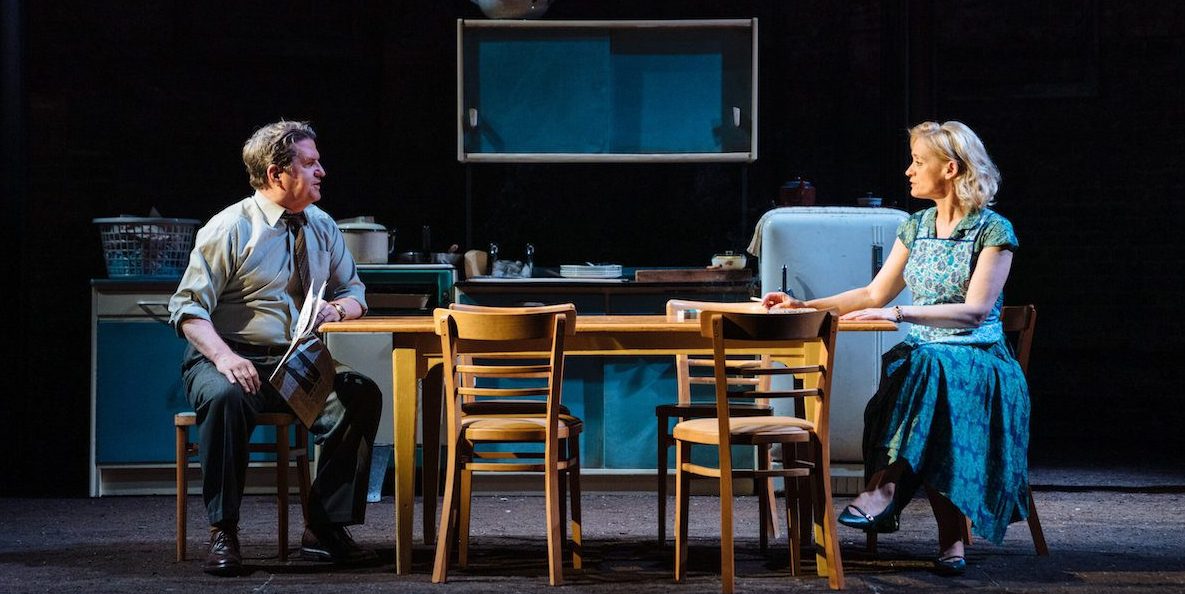Beth Steel’s new play is a tour de force! It is a relentless, and yet sweet, a family drama set against the complex and versatile industrial landscape of working-class Britain.
The play is set in Nottingham and follows a family of six from 1965 all the way to 2019. The structure is very ambitious but Steel manages to pull it off. A range of key dates is projected on the Almeida’s brick wall each time a new episode begins. The story takes us from 1965 to 1979, onwards to 1985 and 1996, before landing in 2019. Each year and each episode is marked by significant historical events which also affect the family’s financial and mental state. For instance, when the play starts a newly Labour government has just come into power, and the post-war social settlement is still intact. However, as the play develops, more key events come to shape the plot and the characters’ journeys. For instance, The Winter of Discontent or the defeat of the miners’ strike of 1984-1985 or Thatcher’s government is all providing the backdrop for a story that spans so many decades. Indeed The House of Shades is a family saga against the backdrop of a society in decline. The play is certainly ambitious, but it nonetheless becomes – occasionally – convoluted and stagnant. It often asks too much from the audience, cramming a lot of information in short episodes.
Despite this, the production is successful in creating a nostalgic and ominous atmosphere, keeping the audience engaged throughout the 2 hours and 45 minutes. The powerful ensemble is led by the incredible Anne-Marie Duff who is truly admirable in the performance that she gives. She plays a deeply disappointed and unsatisfied matriarch, Constance, a woman who was never given the chance to become the person she could become. Her ambition and aspirations were stifled, alongside her talent, as she was forced to marry the first person that came along, just to escape her miserable home and abusive father. What is exceptional in Steel’s play is that all characters are complex and multi-dimensional, they are both victims and abusers, flawed and lost.
Constance is in a very unhappy marriage. But her husband, Alistair (beautifully depicted by Stuart McQuarrie), is also a victim. He is constantly mocked by his wife for being a man without much ambition, working in the same factory for decades, and having achieved very little in his life. Constance finds every possible chance to make clear how unsatisfied and unhappy she is, often bringing the rest of the family in front of very uncomfortable situations. Kelly Gough as the daughter of the family, Agnes, and Michael Grady-Hall as the son, Jack, are superb in depicting the two siblings who despite growing up in the same family, could not have ended up taking more different routes to one another.
Three generations of the Websters are plagued by disillusionment, trauma, and false hopes for a changing world. In 1996 Agnes bitterly observes how “there’s nothing around here anymore, just boozers and hairdressers” blaming the Tories for financially destroying her town. Ironically, her daughter, towards the end of the play (and while we have fast-forwarded to 2019) admits how she is earning six pounds seventy an hour… The ending of the saga is bitter and bleak. Can much change in the years to come? Families like the Websters seem trapped in an endless cycle of misery.
Beth Steel has written an epic play, bringing to mind the iconic trilogy by Aeschylus and the famous House of Atreus from Greek mythology. Constance is not a Queen-like Clytemnestra and Alistair is not a King like Menelaus – but they both find themselves trapped in the same loop of violence and pain.
All in all, the production team has done an excellent job bringing this piece to life. The minimal set design by Anna Fleischle provides the perfect backdrop for the tragedy to unfold, while Liam Bunster’s costumes are subtly marking the changes in the decades. Gregory Clarke’s sound design is successful in contributing to the roller-coaster of emotions, punctuating key moments and transitioning from one episode to the next.

